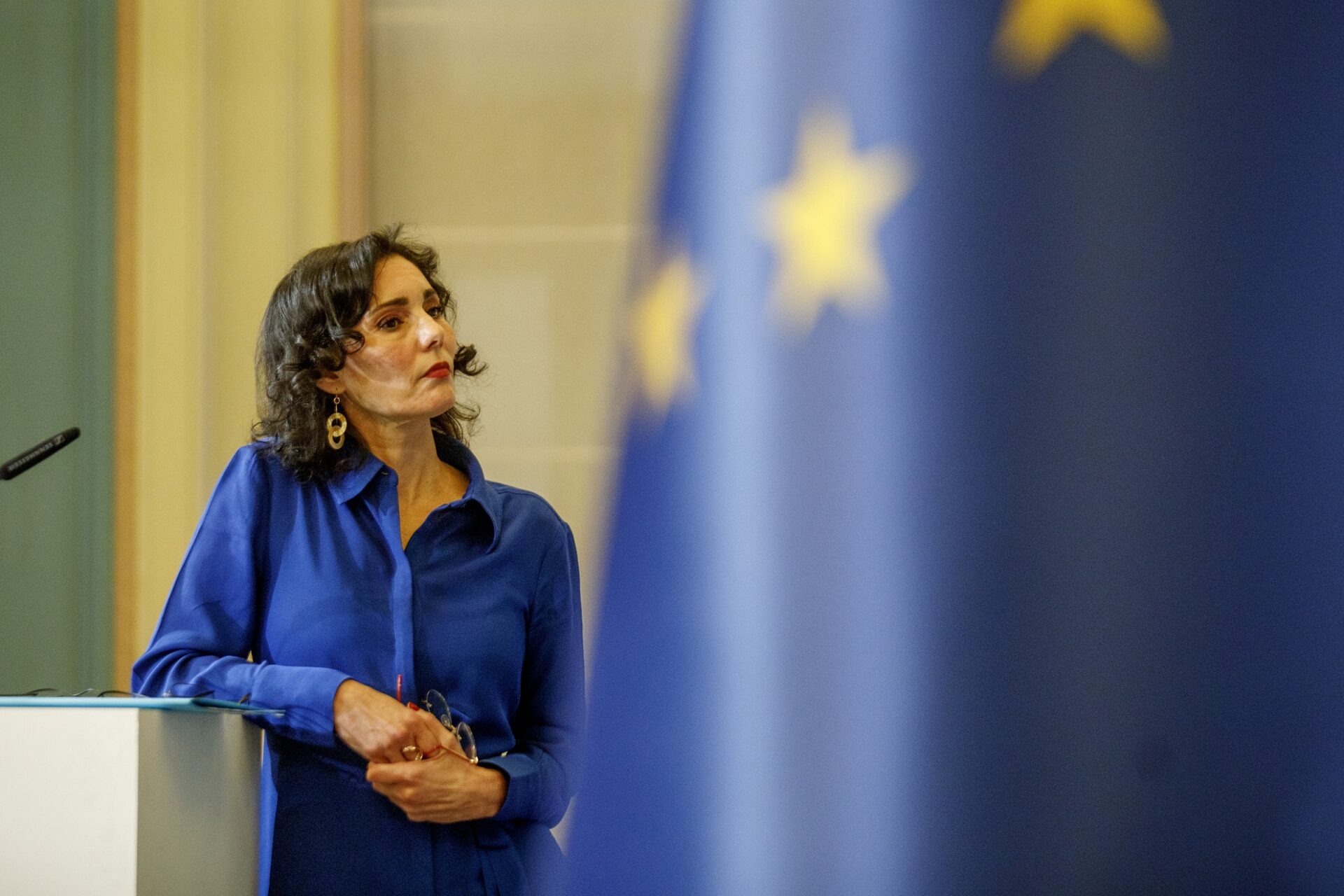It is a crisp, fresh Saturday afternoon in January, but Hadja Lahbib is still at work at the Belgian Foreign Ministry in the Rue des Petits Carmes near the Sablon. She has a corner office with a glorious view of Brussels from her windows, beneath a rare deep blue sky. Lahbib, who has been Belgium’s Foreign Minister since June 2022, would love to be outside, even if, as she says, she prefers cloud-filled skies that evoke a parade of fluffy animals.
“When I was little, and first went to Algeria, the sky was all blue, and I said to myself, ‘It's boring. You can't imagine elephants, giraffes and dinosaurs,’” she says. “When it rains in Brussels, even when it's completely grey, I feel at home. I am never bored looking at the Belgian sky, because it is always changing, there are always these grey, white clouds. I come from a generation that didn't have social networks, that didn't have video games, so we knew how to let our imagination run wild, and the sky is magnificent for that. And so, Belgium is my home.”
This paean to Belgian weather is unexpected. But Lahbib’s rise to lead Belgian diplomacy is unlikely too. She is the daughter of a shepherd from the Kabyle Berber community in northern Algeria who migrated to the Borinage coal mining region on the outskirts of Mons to work in the pit.
A longtime news anchor at RTBF, the francophone public broadcaster, and a respected documentary maker, she spent almost her entire career in journalism before becoming Foreign Minister. She has no formal political pedigree: she has never held elected office or been associated with a political party – even if she owes her position to the centre-right liberal party, the MR (Mouvement Réformateur). It was the MR leader, George-Louis Bouchez, who also hails from the Mons region, who ensured she was given the job after her predecessor Sophie Wilmès stepped down.
The announcement surprised her too. But she was persuaded by Bouchez who said that politics needed new faces from more diverse backgrounds and that she was a meritocratic symbol. “If we want to renew politics, we must also be ready to commit a moment in our lives,” she says. “It’s not easy. It's something that I agreed to do knowingly, discussing the pros and cons with my friends, with my family – and with my conviction that the political world should renew itself, to have people from civil society who have field experience like I have.”
Journalists often see politics through a wary eye, but Lahbib describes it as “a very noble vocation,” adding that, “you really have to dedicate yourself to it, put your family, your friends, your children aside, see them much less, and risk losing them.”
She is also under no illusions about the brutal nature of politics. “You have to be able to land on your feet when it ends. You know how political lives are unpredictable: one day you have a big office with people collaborating with you, and then overnight you can be nobody,” she says.
Journalistic journey
This was not how Lahbib saw herself when she was young. Born in Boussu, the 53-year-old grew up in the tough mining community at a time when pits were being shut down. “We had no holidays, not many possibilities of escape. We didn’t have the same chances as everyone else,” she says. “Even as a child, you feel it: in your clothes, in your home, in the opportunities, in the gifts, etc. As a result, very quickly – especially as a girl – you have the feeling that you are going to have to roll up your sleeves, make an effort and that only you can help yourself. So, I was very aware that I had to do better than the average, and to be brilliant in some way – this was the only way to distinguish yourself and get back on track.”
She was fascinated by planes, often staring out of the windows at them crossing the skies. And she had ambitions, asking her parents for a typewriter for her birthday. “I painted, I drew, I wrote a lot. I had a thirst to learn, to discover, to really learn,” she says. “I always told myself that if I wrote a book, I would start by saying ‘And yet, it all began badly…’ But I have always been an optimist. I had a lot of fire, of energy in me. My mum would say, that if I had to start again ten times, I was capable of starting 11 times.”
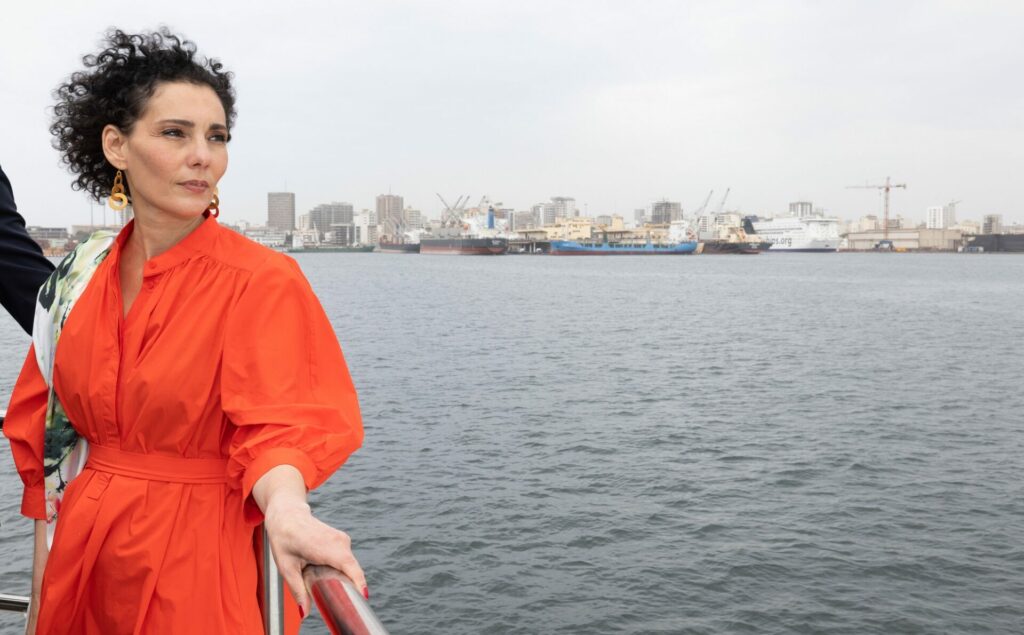
Visiting Dakar, Senegal
After high school, she studied journalism at Brussels Free University (ULB) and was soon hired by RTBF as a reporter in far-flung regions. That included covering the wars in Afghanistan and Iraq, and conflicts in Israel and the occupied territories. “It was dangerous - we all knew it. But when you want to be a witness to history, it is also a privilege to be able to explain it and to contribute to a better understanding of the world,” she says, adding that she never wore a bulletproof vest. “I think it attracted more attention.”
In the 2000s, she became the lead anchor for the evening news. At the same time, she began making documentaries, on subjects as varied as women in Afghanistan, on North African immigrant women in Belgium, on women in a Kenyan village, and Belgian crooner Salvatore Adamo. She also presented a monthly cultural program on Arte "Le Quai des Belges" and then its bilingual version "Vlaamse Kaai" alongside different Flemish writers. During that time, she lived in Liège for ten years before returning to Brussels.
In 2019, Lahbib stepped down as a presenter to manage RTBF's public services. Two years later, she became Vice-President of the CSEM (Higher Council for Media Education) in the Wallonia-Brussels Federation. She was also the co-leader, with former KVS artistic director Jan Goossens, of the Brussels bid for the title of European Capital of Culture in 2030.
Role model
Lahbib’s Maghrebian background has been a defining feature of her career, and one that she was initially uncomfortable with. “My parents were first-generation immigrants, and I was born in Belgium, so obviously, I am one of those first young girls to become visible to the community,” she says.
However, she did not want to be seen as a tokenistic appointment and preferred to be recognised for her talent and perseverance. “When opportunity comes, you can’t let it pass by – you must seize it,” she says. “I worked hard because I came from a disadvantaged background – there was a lot of catching up to do, people asked a lot of me. It came little by little. And I was seen as a role model.
“At first, I said to myself, ‘I’m not a standard bearer.’ I have never been very communitarian,” she says. “I have friends from all backgrounds, very diverse: Belgian friends, Jewish friends, Italian, Spanish, Moroccan friends, from all backgrounds and ages. But then I realised that it also meant a lot for a community where people don’t have the same opportunities and where people have a name like mine, which is difficult to pronounce.”
She says that she now recognises that her trajectory shows the importance of representation in public life. “It showed that it was possible, by working hard, by persevering, by believing in your dreams,” she says. “I realised I was sending messages to these young girls, to these young men who are discriminated against, who don’t get into nightclubs easily, because of how they look, or because they have a certain name.”
Indeed, as she became a familiar face, she noted that people would even tell her that she rose because of her fame. “Afterwards, people said, ‘If you are there, it's because your name is Hadja Lahbib.’ And at that moment, your burden becomes a quality – and you shouldn’t get angry. You should say, ‘It's part of what I am, I'm not going to change my name, my origins, or my gender. It's part of me, one day it helps me, one day it doesn’t, but whatever happens, I am myself, I carry on and I persevere.’”
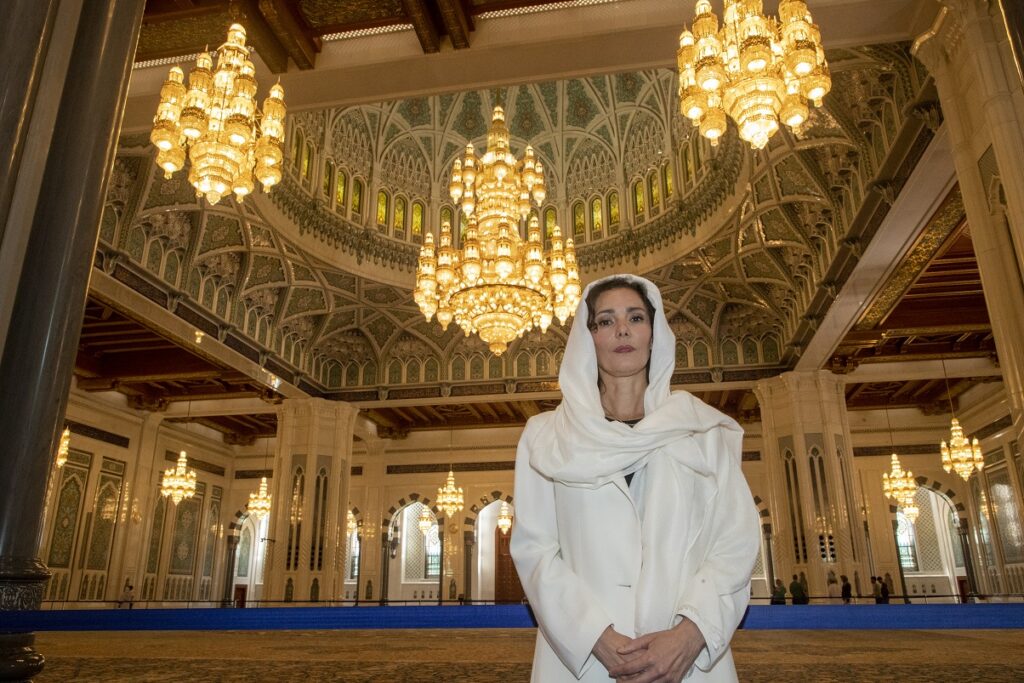
A trip to Muscat, Oman
While her parents are still practising Muslims, Lahbib talks about her fascination for Buddhism. But politics and religion never come up at home, she says. “We don't see each other much, so we talk about the children, we talk about health. My family is very worried, my mother especially because she sees that I travel a lot, that I sleep little, and that's what interests them,” she says, adding that even when she was a journalist, they would reproach her for appearing on the front page of a magazine and not letting them know.
Ministry of crises
Lahbib became Foreign Minister in June 2022, four months into the war in Ukraine, when Europe was struggling with its first major conflict on its borders since the Yugoslav wars of the 1990s. “I was asked to leave a comfort zone,” she says. “But with the decline of democracy, the rise of extremism, the breakdown of trust between citizens and the political world, it all convinced me that perhaps I had something different to bring to the table and that more than ever it was necessary to defend the founding values of our democracies. Rather than scaring me away, it convinced me that I needed to take this on.”
There have been questions about her judgement. Days after being appointed, it emerged that she had taken a trip to Crimea, in July 2021 to shoot a documentary for the RTBF on a theatre festival, paid for by the festival organisers. The peninsula, annexed by Russia from Ukraine in 2014, is recognised internationally as part of the Ukrainian territory.
And last year she came under fire for granting visas to 14 Iranian officials, including hardline Tehran Mayor Alireza Zakani, to attend a conference in Brussels last week. The chief organiser of the conference, Brussels Secretary of State Pascal Smet, resigned over the incident, but many suggested he had been unfairly blamed for a mistake by the Foreign Ministry. Lahbib was twice summoned to the Belgian parliament to explain her role, and while she failed to assuage critics, the issue was only laid to rest when Bouchez said that if she was forced out, he would pull the MR from the coalition and bring the government down. Later, Lahbib and Prime Minister Alexander De Croo said the visas helped secure the release of Belgian aid worker Olivier Vandecasteele and the other hostages held in Iran.
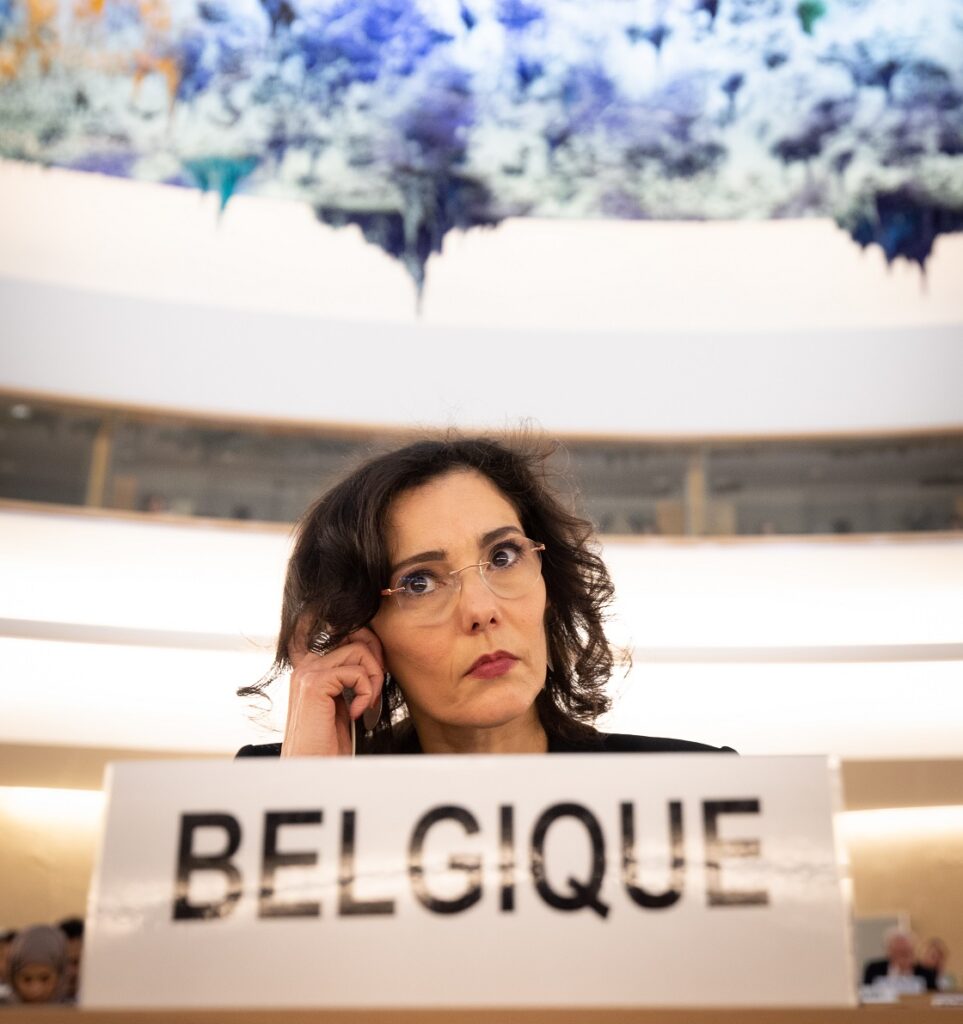
At the UN Human Rights Council, in Geneva
Still, Lahbib says her background as a former journalist is an asset. “I tend to be very spontaneous and natural,” she says, adding that when she is with her foreign minister counterparts, they often ask about her experience in the field. “I think that what defines me is a curiosity and a desire to be in the middle, to be a conduit, to be someone who passes a message. And then, one day, I was offered the chance to make decisions and not just ask questions. It's already a lot to be able to ask good questions and be a witness to history and explain what is happening to people.”
She also suggests her outsider status is a counter to the stuffy and occasionally nepotistic Belgian political world, and points to a recent study showing that one in ten Belgian MPs has a parent elected to national office. That includes Alexander De Croo, whose father Herman held various ministries and is the longest serving Belgian MP; and that former Prime Minister Charles Michel from her own MR party, who is the son of former Foreign Minister Louis Michel. “There was a whole TV show on why there are so many sons of politicians in politics. I embody something else – and I hope that I also reflect what citizens want,” she says.
Values
This anti-establishment streak led her to stand up for LGBTQ rights during the World Cup in Qatar in November 2022. With homosexuality in Qatar illegal and punishable by up to three years in prison, the hosts had even banned players from wearing the pride colours of the One Love armband, but Lahbib was pictured wearing a Red Devils t-shirt and the One Love armband while speaking to FIFA President Gianni Infantino during one of the games.
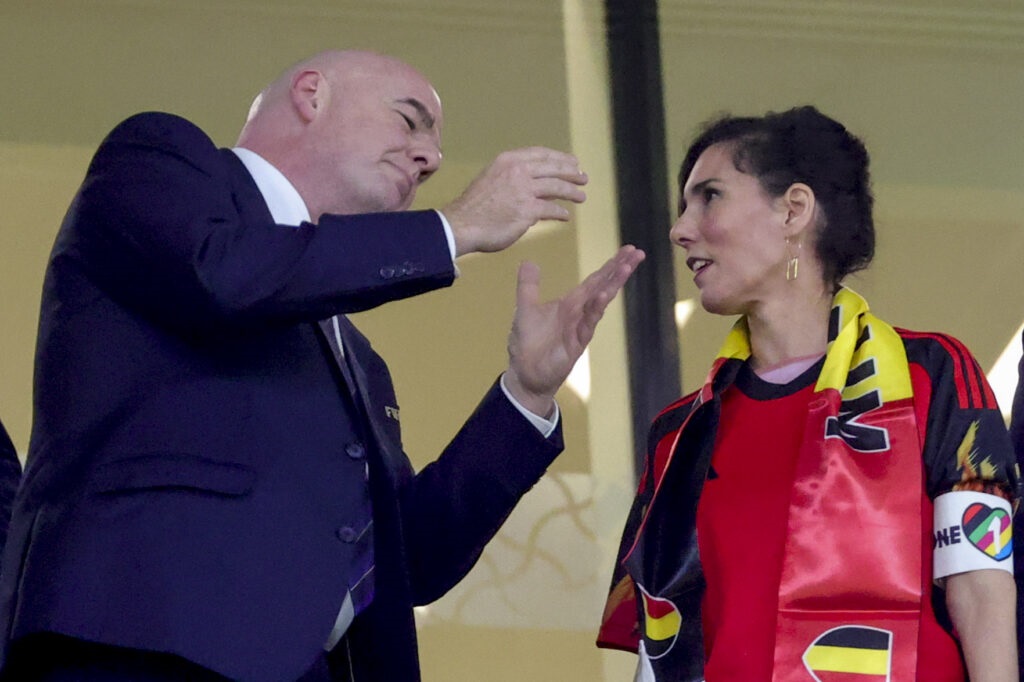
Wearing a One Love armband at the 2022 World Cup in Qatar
While she is keen to uphold her values in an increasingly polarised world, she is also realistic about how to address the challenges. “There are no simple answers to complex questions,” she says. “Today with social networks we are very binary: yes, no; good, not good. That's what we see with the extremes who come to power. But once they are in power, they have to start thinking.”
As examples. she points to Argentina’s recently elected populist President Javier Milei and Italy’s hard-right Prime Minister Giorgia Meloni, both of whom have had to curb their extremist rhetoric once they took office. She is also watching the US, where Donald Trump is leading the polls ahead of the November elections. “I am not telling you anything new when I say that I look at what is happening in the United States with concern. Once the extremes have power, it doesn't work. So if I have a message it is, don't give in to people who have very simple, seductive speeches because often it's not realistic.”
As for the current conflict in the Middle East, she is careful not to weigh in too heavily. She vociferously condemned the Hamas massacre of Israelis on 7 October and also urged Israel to restrain its retaliatory attacks on Gaza. Her point is, rather, that these situations are complicated. “There are a lot of people who say, ‘Why you don't call back your ambassador and cut all ties with them?’ But then we won't be able to talk anymore. So what do we do? Do we give up?” Instead, she urges people to stick to diplomacy and negotiation, which have already proved crucial in securing the release of hostages. “Words are stronger than weapons,” she says.
Compromis à la belge
With Belgium holding the European Union’s Council presidency, Lahbib is at the heart of a diplomatic whirlwind. It’s a particularly intense six months as the Council has to wrap up a mass of legislation with the European Parliament before the elections in June – although the window will effectively close in April, with MEPs off campaigning for re-election by then.
Lahbib seems to relish the challenge. She talks of Belgium as a country of ‘plantrekkers’, a Flemish term loosely equivalent to a self-starter; and she refers to ‘le compromis à la belge’, the ability to find a solution in any situation.
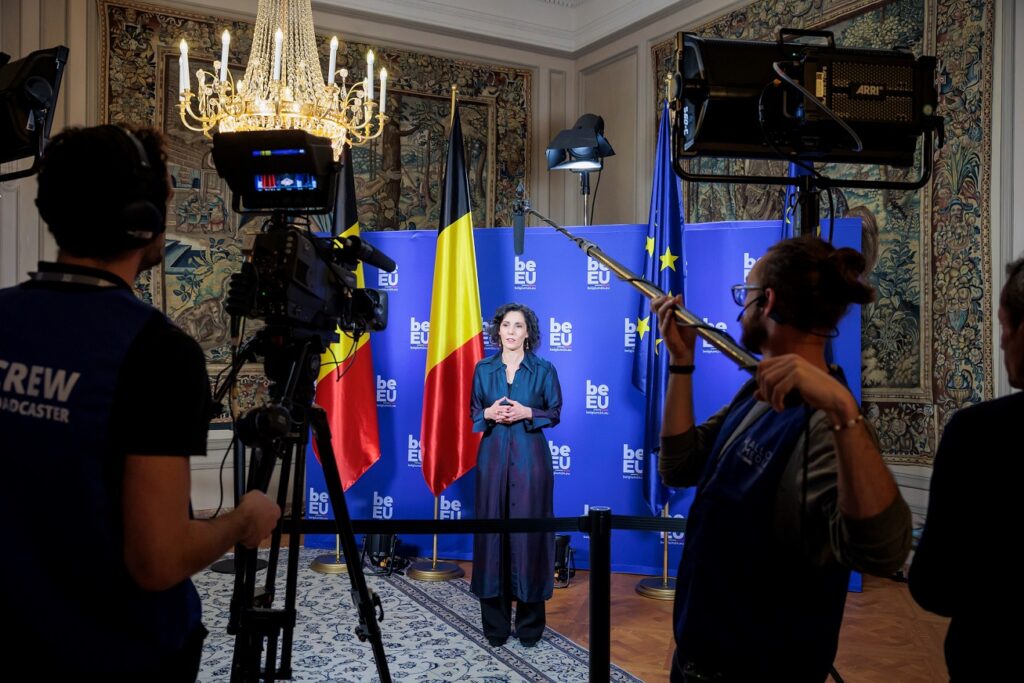
At the launch of Belgium's EU's presidency
She is happy to celebrate Belgium’s diversity and complexity, with its three languages, and its different regions and communities. “I tell myself that it is not for nothing that Belgium is one of the founding countries of the European Union,” she says. “For me, Belgium is a laboratory. The divisions we have inside sometimes reflect the divisions that we have much higher up, on a larger scale. The challenge is to bring together people who are at the opposite end of the political, linguistic, and community spectrum, but who at the same time, fundamentally, cannot do without each other and have everything in common. These are poles which attract each other, which divide, but which cannot live without one another.”
Belgium will also have its national and regional elections on the same day as the European Parliament. Lahbib, who describes herself as "neither left nor right," is running for her first elected position: she is second on MR’s list of candidates for the Brussels-Capital Region.
She celebrates Brussels’s international vocation, with so many foreigners settling there. “At the same time, I would like these people to mingle more with the population, with the people in Molenbeek or Schaerbeek. I would like to build more bridges and more connections between these bubbles: they are worlds that live side by side but do not rub shoulders – and these worlds can enrich each other,” she says.
She also delights in discovering unsuspected corners of Brussels. “When I have family or friends who come, I always have a lot of fun telling them, ‘You know the Grand Place, and you know Manneken Pis, but do you know Jeanneke Pis? Do you know the Rue de la Cigogne, this small pedestrian street near the Place Sainte-Catherine district?’ It's all these secrets that I want to share, and I never get tired of it.”

